人教版PEP小学英语五年级下册unit1至unit3知识点归纳
五年级下册英语1至3单元知识点
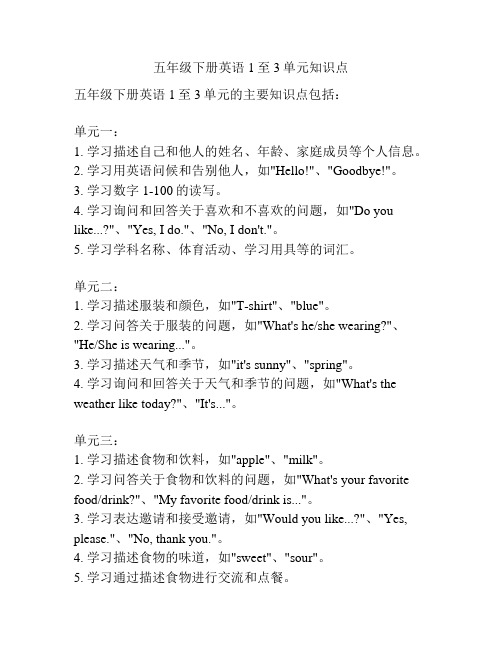
五年级下册英语1至3单元知识点五年级下册英语1至3单元的主要知识点包括:单元一:1. 学习描述自己和他人的姓名、年龄、家庭成员等个人信息。
2. 学习用英语问候和告别他人,如"Hello!"、"Goodbye!"。
3. 学习数字1-100的读写。
4. 学习询问和回答关于喜欢和不喜欢的问题,如"Do you like...?"、"Yes, I do."、"No, I don't."。
5. 学习学科名称、体育活动、学习用具等的词汇。
单元二:1. 学习描述服装和颜色,如"T-shirt"、"blue"。
2. 学习问答关于服装的问题,如"What's he/she wearing?"、"He/She is wearing..."。
3. 学习描述天气和季节,如"it's sunny"、"spring"。
4. 学习询问和回答关于天气和季节的问题,如"What's the weather like today?"、"It's..."。
单元三:1. 学习描述食物和饮料,如"apple"、"milk"。
2. 学习问答关于食物和饮料的问题,如"What's your favorite food/drink?"、"My favorite food/drink is..."。
3. 学习表达邀请和接受邀请,如"Would you like...?"、"Yes, please."、"No, thank you."。
五下英语1-3单元知识整理

五下英语1-3单元知识整理Unit 1: My Day.Vocabulary:morning: the time of day from when it becomes light until noon.afternoon: the time of day from noon until evening.evening: the time of day from when it becomes dark until bedtime.night: the time of day from bedtime until it becomes light again.usually: in the ordinary course of events; habitually.noon: the middle of the day, when the sun is highestin the sky.bedtime: the time when a person goes to sleep.wake up: to become conscious after sleeping.wash: to clean (oneself or something) with water.brush: to clean (one's teeth) with a brush.eat breakfast: to have a meal in the morning before starting the day's work or activities.go to school: to attend a school as a student.have classes: to participate in educational lessons.do morning exercises: to perform physical activities in the morning to improve health and fitness.eat lunch: to have a meal in the middle of the day.go home: to return to one's residence.eat dinner: to have a meal in the evening.do homework: to complete assignments given by a teacher.watch TV: to observe television programs.go to bed: to retire for the night to sleep.Grammar:Present Simple Tense: Used to describe habitual actions or states of being that occur regularly or are always true.Frequency Adverbs: Used to describe how often something happens (e.g., usually, often, sometimes, never).Sentences:I usually wake up at 7 a.m.I wash my face and brush my teeth every morning.I eat breakfast at 7:30 a.m.I go to school at 8 a.m. and have classes until noon. We do morning exercises every day.I eat lunch at school.I go home at 3 p.m. and eat dinner at 6 p.m.I usually do my homework after dinner.Sometimes I watch TV before going to bed.I go to bed at 9 p.m. and sleep well every night.Unit 2: My Favourite Season.Vocabulary:season: one of the four divisions of the year, namely spring, summer, autumn, and winter.spring: the first season of the year, when the weather becomes warm and plants begin to grow.summer: the second season of the year, when the weather is hot and sunny.autumn (or fall): the third season of the year, when the leaves change color and the weather becomes cooler.winter: the fourth season of the year, when the weather is cold and there is snow.go on a picnic: to take a pleasure trip, usually outdoors, with a meal eaten at the destination.pick apples: to harvest apples from trees.make a snowman: to construct a figure of a person outof snow.plant trees: to cultivate trees, usually as part of a gardening activity.go swimming: to engage in the sport of swimming.go on a trip: to take a journey for pleasure or business.wear: to have clothing on one's body.go hiking: to walk for pleasure or exercise in natural surroundings, often over mountainous terrain.Grammar:Talking about preferences: Using "My favourite..." to express likes and dislikes.Using adjectives to describe nouns: E.g., "warm spring", "hot summer", "cool autumn", "cold winter".Sentences:My favourite season is spring.In spring, the weather is warm and sunny.We often go on picnics and pick apples in the orchard.Summer is also fun because we can go swimming in the river.Autumn is my second favourite season.The leaves change colour and it's beautiful to see.In winter, it's cold and snowy.I love to make snowmen and go sledding with my friends.I usually wear a coat and scarf when it's cold outside.Every year, my family goes hiking in the mountains during the autumn season.Unit 3: My School Calendar.Vocabulary:calendar: a system of arranging days for social, commercial, or religious purposes.school calendar: a schedule of events and activities at a school for a specific period of time (e.g., a semester or a year)。
(完整版)pep五年级英语下册1-3单元复习重点
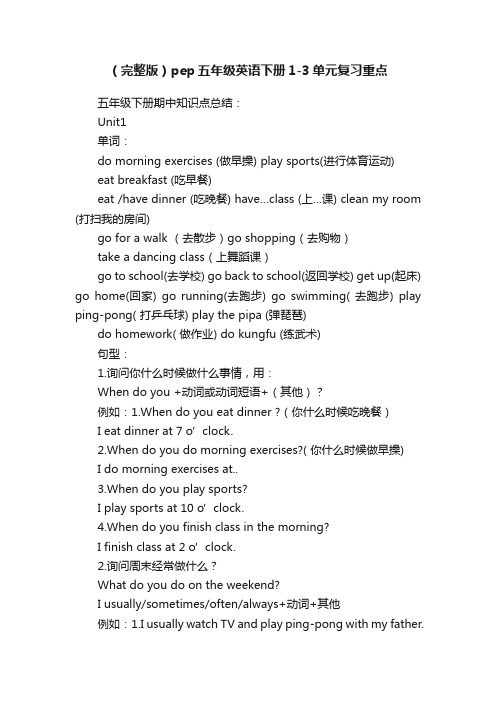
(完整版)pep五年级英语下册1-3单元复习重点五年级下册期中知识点总结:Unit1单词:do morning exercises (做早操) play sports(进行体育运动)eat breakfast (吃早餐)eat /have dinner (吃晚餐) have…class (上…课) clean my room (打扫我的房间)go for a walk (去散步)go shopping(去购物)take a dancing class(上舞蹈课)go to school(去学校) go back to school(返回学校) get up(起床) go home(回家) go running(去跑步) go swimming( 去跑步) play ping-pong( 打乒乓球) play the pipa (弹琵琶)do homework( 做作业) do kungfu (练武术)句型:1.询问你什么时候做什么事情,用:When do you +动词或动词短语+(其他)?例如:1.When do you eat dinner ?(你什么时候吃晚餐)I eat dinner at 7 o’clock.2.When do you do morning exercises?( 你什么时候做早操)I do morning exercises at..3.When do you play sports?I play sports at 10 o’clock.4.When do you finish class in the morning?I finish class at 2 o’clock.2.询问周末经常做什么?What do you do on the weekend?I usually/sometimes/often/always+动词+其他例如:1.I usually watch TV and play ping-pong with my father.( 注意和谁谁谁一起用with)2.I often go shopping.3.I usually clean my room.Unit2单词:season(季节):spring(春天summer(夏天)autumn(秋天)winter (冬天)动词短语:go on a picnic(去野餐)go swimming(去游泳)pick apples(摘苹果)make a snowman (堆雪人)play in the snow(在雪地里玩)plant flowers(种花)eat ice cream(吃冰激凌)weather(天气):warm(暖和的)windy(多风的)sunny(阳光充足的)rainy(下雨的)cold(寒冷的) cool(凉爽的)hot(热的) 特殊疑问词:what(什么)when(何时) where(哪里)which(哪一个)why(为什么)句型:1.询问最喜欢哪个季节:Which season do you like best?(你最喜欢哪个季节?)I like spring/summer/autumn/winter best!2.询问为什么喜欢某个季节Why (do you like it)? Because……例如:Why do you like summer?Because I like summer vacation. (Because 引导一个完整的句子) Why ? Because there are pretty flowers.3.询问天气情况如何What’s the weather like? It is ..Unit 3单词:January(Jan.)一月:一月一日元旦节(New Year’s Day)winter vacation(寒假)February (Feb.) 二月:winter vacation(寒假)March (Mar.) 三月:三月十二日植树节(Tree Planting Day)April(Apr.)四月:复活节聚会(Easter party)sports meet(运动会)May 五月:五月一日国际劳动节(May Day)五月的第二个星期日(Mother’s Day)sing ing contest(唱歌比赛) school trip(学校旅行)June (Jun.)六月:六月一日儿童节(Children’s Day)六月的第三个星期日是父亲节(Father’s Day)July (Jul.)七月:summer vacation(暑假)August (Aug.)八月:summer vacation(暑假)September (Sept.)九月:九月十日教师节(T eacher s’Day)Mid-Autumn Day(中秋节) October (Oct.)十月:十月一日国庆节China’s National DayNovember (Nov.)十一月:十一月第四个星期四American Thanksgiving Day(感恩节) December (Dec.)十二月:十二月二十五Christmas (圣诞节)句型:1.询问某某节日或活动是在什么时候When is +节日或活动名称?It’s in+月份。
人教版小学PEP英语五年级下册知识点归纳
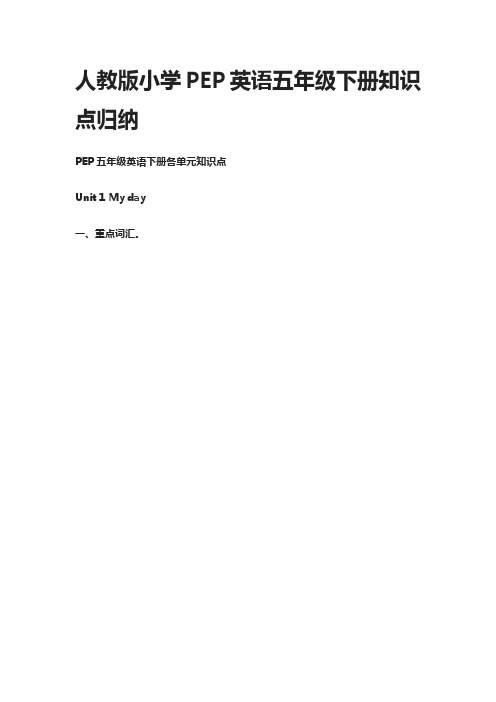
人教版小学PEP英语五年级下册知识点归纳PEP五年级英语下册各单元知识点Unit 1 My day一、重点词汇。
五、重点句型。
1、询问别人什么时候做某事的句型及回答。
句型结构:问:When do you+动词短语原形+其他?(你/你们什么时候做某事?)答:I/We(+频度副词)+动词短语原形+at+具体时间(我/我们通常在几点做某事。
)例:问:When do you go to bed?(你什么时候上床睡觉?)答:I go to bed at 9:00p.m (我晚上9点上床睡觉。
)注意:当主语是第三人称单数(he,she,it,单个人名或单数名词)时,助动词do 要变成does,句型结构是:When does+主语(第三人称单数)+动词短语原形+其他?2、询问别人周末做什么的句型及回答。
句型结构:问:What do you do on theweekend?(你周末做什么?)答:I(+频度副词)+动词(短语)+其他。
例:问:What do you do on theweekend?(你周末做什么?)答:I usually read books. (我通常看书。
)注意:当主语是第三人称单数(he,she,it,单个人名或单数名词)时,助动词do 要变成does,句型结构是:What does+主语(第三人称单数)+do+on the weekend?六、四会句子:When do you finish class in the morning ? 你们上午的课到几点结束?We finish class at 1 o’clock . 我们一点钟结束上午的课。
What do you do on the weekend ? 你周末做什么?I often watch TV and play ping-pong with my father . 我经常看电视,也常和我爸爸一起打乒乓球。
七、语音:cl /kl/ clean clock class cleverpl /pl / plate eggplant please play Unit 2 My favourite season三、重点句型1、询问别人天气怎么样的句型及回答。
五年级下册英语素材-unit1-3知识点归纳与延伸 人教PEP版
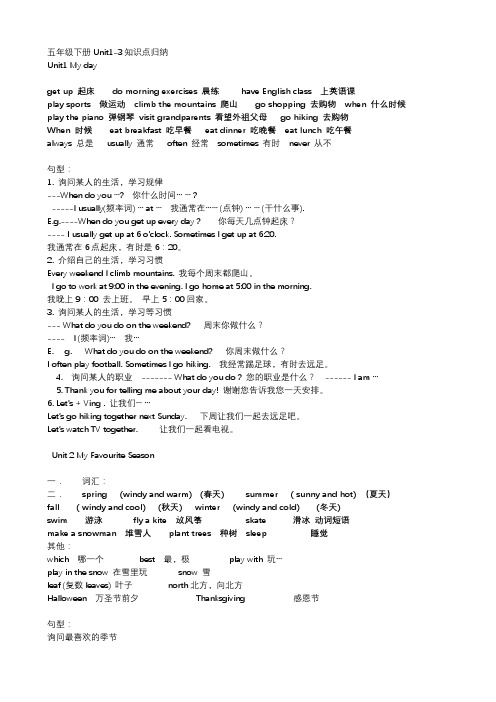
五年级下册Unit1-3知识点归纳Unit1 My dayget up 起床do morning exercises 晨练have English class 上英语课play sports 做运动climb the mountains 爬山go shopping 去购物when 什么时候play the piano 弹钢琴visit grandparents 看望外祖父母go hiking 去购物When 时候eat breakfast 吃早餐eat dinner 吃晚餐eat lunch 吃午餐always 总是usually 通常often 经常sometimes 有时never 从不句型:1. 询问某人的生活,学习规律---When do you …? 你什么时间… … ?-----I usually(频率词) … at … 我通常在…… (点钟) … … (干什么事).E.g.----When do you get up every day ? 你每天几点钟起床?---- I usually get up at 6 o’clock. Sometimes I get up at 6:20.我通常在6点起床,有时是6:20。
2. 介绍自己的生活,学习习惯Every weekend I climb mountains. 我每个周末都爬山。
I go to work at 9:00 in the evening. I go home at 5:00 in the morning.我晚上9:00 去上班。
早上5:00回家。
3. 询问某人的生活,学习等习惯--- What do you do on the weekend? 周末你做什么?---- I (频率词)… 我…E. g. What do you do on the weekend? 你周末做什么?I often play football. Sometimes I go hiking. 我经常踢足球,有时去远足。
五年级下册1-3单元知识点
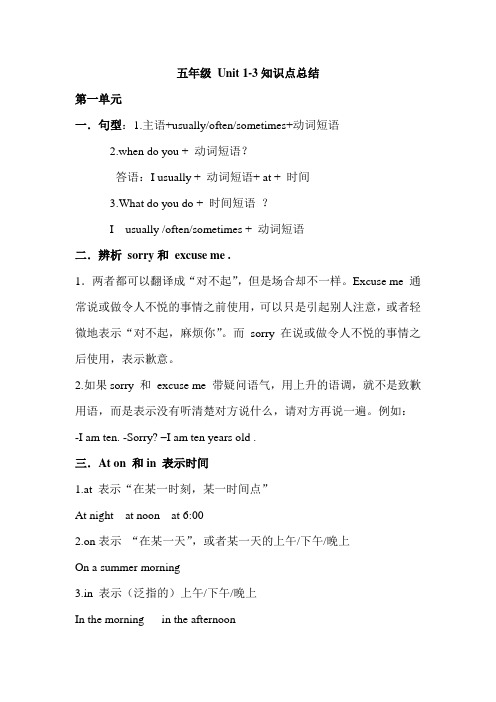
五年级Unit 1-3知识点总结第一单元一.句型:1.主语+usually/often/sometimes+动词短语2.when do you + 动词短语?答语:I usually + 动词短语+ at + 时间3.What do you do + 时间短语?I usually /often/sometimes + 动词短语二.辨析sorry和excuse me .1.两者都可以翻译成“对不起”,但是场合却不一样。
Excuse me 通常说或做令人不悦的事情之前使用,可以只是引起别人注意,或者轻微地表示“对不起,麻烦你”。
而sorry 在说或做令人不悦的事情之后使用,表示歉意。
2.如果sorry 和excuse me 带疑问语气,用上升的语调,就不是致歉用语,而是表示没有听清楚对方说什么,请对方再说一遍。
例如:-I am ten. -Sorry? –I am ten years old .三.At on 和in 表示时间1.at 表示“在某一时刻,某一时间点”At night at noon at 6:002.on表示“在某一天”,或者某一天的上午/下午/晚上On a summer morning3.in 表示(泛指的)上午/下午/晚上In the morning in the afternoon或者某段时间(某年,某月,某日)第二单元句型 1. 就喜欢的季节和原因进行问答What is your favourite season ? My favourite season isWhich season do you like best ? I like…bestWhy do you like…? Because2.就天气情况进行问答What is the weather like? -cold3.对话题进行转换。
Spring is good, but summer is my favourite season.一词多义:Fall 1.秋天。
PEP小学英语五年级下册Unit1--Unit3重点知识
Unit 1 This Is My Day重点单词do morning exercises晨练eat breakfast吃早饭have English class上英语课play sports进行体育运动eat dinner吃晚饭when什么时候evening夜晚;晚上get up起床at在……点钟usually通常;一般noon中午climb mountains爬山go shopping购物;买东西play the piano弹钢琴visit grandparents看望祖父母go hiking去远足weekend周末often经常sometimes有时候话题1:日常生活时态:一般现在时1.——When do you do morning exercises? 你什么时候做早操?——I usually do morning exercises at 8:00. 我经常八点钟做早操。
(I usually get up at 12:00 at noon . 我经常在中午十二点起床。
) 2.——When do you eat dinner ? 你什么时候吃晚餐?——I eat dinner at 7:00 in the evening. 我在晚上七点种吃晚餐。
3.——When is the best time to go to Beijing? 最好在什么时候去北京?——Fall. 秋天。
Unit 2 My Favourite Season重点单词spring春天summer夏天fall秋天winter冬天season季节which哪一个best最;极swim游泳fly kites放风筝skate滑冰make a snowman堆雪人plant trees种树why为什么because因为sleep睡觉Halloween 万圣节Thanksgiving 感恩节话题2:季节时态:一般现在时1.——Which season do you like best ? 你最喜欢是什么季节?——I like spring best.(Spring.) 我最喜欢春季。
人教版英语五年级下册知识点1-3单元
人教精通版五年级下册unit 1 知识汇总一、词汇library 图书馆 borrow (向某人、从某人)借 borrow books 借书 meeting room 会议室have a meeting 开会welcome 欢迎meet 相遇、开会our 我们的English lesson 英语课language lab 语言实验室science lesson 科学课science lab 科学实验室 we 我们have 有all 所有;全部 like 喜欢very much 非常;很 art club 美术(艺术)俱乐部paint a picture (用颜料)绘画 music club 音乐俱乐部play the piano 弹钢琴many 许多 way 路;道路 please 请also 也;同样二、句子1. Welcome to our school! 欢迎来到我们的学校。
2. We often borrow books from the library. 我们经常从图书馆借书。
3. We’ll show you around our school. 我们会带你参观我们的学校。
4. This way, please. 这边请。
5. This is our science lab. 这是我们的科学实验室。
6. Do you often come to the library? 你经常来图书馆吗?7. How many English lessons do you have in a week? 你们一周有几节英语课?8. How many science lessons do you have in the science lab? 你们在科学俱乐部有几节科学课?9. We have one science lesson in the science lab.我们在科学俱乐部有一节科学课。
PEP小学英语五年级下册各单元重点内容概述
PEP小学英语五年级下册各单元重点内容概述本文档将概述PEP小学英语五年级下册各单元的重点内容。
以下是各单元的简要概述:Unit 1: Family and Friends本单元主要介绍家庭和朋友的相关内容。
学生将研究介绍自己和家庭成员,并能正确运用一些常见的动词和形容词,描述他们的家庭和朋友。
Unit 2: School Days本单元着重介绍学校生活。
学生将研究家具、教室用品以及学校活动等方面的词汇,并能够就日常研究和活动进行简单的交流。
Unit 3: At the Zoo本单元将带领学生走进动物园。
学生将了解各种动物以及它们的特征。
他们也将学会如何描述和比较不同的动物。
Unit 4: Sports and Hobbies本单元将探讨体育和爱好。
学生将研究描述不同体育运动和爱好的词汇,并能够就自己的喜好进行表达。
Unit 5: Food and Health本单元将关注食物和健康。
学生将研究各种食物的名称和描述,同时也会探讨健康和饮食惯的重要性。
Unit 6: My Neighborhood本单元将介绍学生所在的社区。
学生将研究描述自己的住所和周围环境的词汇,并能够就不同位置进行简单的指示。
Unit 7: Weather and Seasons本单元将涉及天气和季节。
学生将研究各种天气状况的词汇和描述,并了解不同季节的特点。
Unit 8: Holidays and Festivals本单元将介绍各种假期和节日。
学生将研究诸如春节、圣诞节等节日的名称和庆祝活动,并能够就个人喜好进行交流。
Unit 9: On the Farm本单元将带领学生了解农场。
学生将研究农场里各种动物和农作物的名称,并能够描述它们的特点。
Unit 10: Travel and Adventure本单元将聚焦旅行和冒险。
学生将研究描述不同交通工具以及旅行地点的词汇,并能够描述自己的旅行经历。
以上是PEP小学英语五年级下册各单元的重点内容概述。
五年级下册英语一至三单元的重点知识
五年级下册英语一至三单元的重点知识五年级下册英语一至三单元的重点知识随着学生年级的升级,英语学科内容也不断加深。
对于五年级的学生来说,下册的一至三单元无疑是他们英语学习的重点。
本文将具体讲解这三个单元中的重点知识,以帮助学生更好地掌握课程。
一、Unit 1 School life1.表示时间的英文词汇时间在日常生活中非常重要,英文中也有许多表示时间的词汇,例如:morning, afternoon, evening, Monday, Tuesday, Wednesday, Thursday, Friday, Saturday, Sunday等。
学生需要关注这些词汇的正确发音和用法。
2.数词及其表达方法在学习英语时,数词也是必不可少的内容。
对于五年级的学生来说,除了掌握基本的数词之外,还需要注意英文中的日期及其表达方法,例如:January 1st, December 25th等。
3. 班级及学校活动的表达在学校中,学生不仅需要学习课程内容,还需要参加各种班级和学校活动。
学生需要掌握表示这些活动的常用词汇,例如:classroom, library, playground, sports day, school trip等。
二、Unit 2 Hobbies and interests1.频率副词的用法在英文中,频率副词指表示事件发生次数或频率的副词,例如:often, sometimes, always, never等。
学生需要明确这些副词的用法,并尝试在日常生活中使用它们。
2.谈论自己的爱好及兴趣在英语课上,教师会引导学生讨论自己的爱好及兴趣。
学生需要学会使用一些基本的英文表达方式,比如:I like…, I love…, My hobby is…等。
3.运动及体育活动的表达运动和体育活动是许多学生的兴趣爱好。
在英语课上,学生需要学习运动及体育活动的英文表达方式,例如:football, basketball, running, swimming, cycling等。
- 1、下载文档前请自行甄别文档内容的完整性,平台不提供额外的编辑、内容补充、找答案等附加服务。
- 2、"仅部分预览"的文档,不可在线预览部分如存在完整性等问题,可反馈申请退款(可完整预览的文档不适用该条件!)。
- 3、如文档侵犯您的权益,请联系客服反馈,我们会尽快为您处理(人工客服工作时间:9:00-18:30)。
五年级下册Unit 1-3重点难点、单元单词、短语和知识点知识梳理
第一单元知识点
一、主要单词:
do morning exercises晨练,做早操 eat breakfast吃早饭 have English class上英语课 play sports进行体育活动 eat dinner吃晚饭 eat lunch 吃午饭 climb mountains爬山 go shopping购物,买东西 play the piano 弹钢琴 visit grandparents看望(外)祖父母 go hiking去远足
二、主要句子:
When do you eat dinner?你什么时候吃晚饭?
I eat dinner at 7:00 in the evening.我晚上七点吃晚饭。
When do you get up?你什么时候起床?
I usually get up at 12:00 at noon.我通常在中午12点起床。
What do you do on the weekend?你在周末干什么?
Usually I watch TV and go shopping.我通常看电视和购物。
Sometimes I visit my grandparents.有时候我去看望我的外祖父母。
I often play football.我经常踢足球。
Sometimes I go hiking.有时候我去远足。
三、同义词
eat breakfast—have breakfast eat lunch—have lunch
eat dinner—have dinner play sports—do sports usually—often
复数形式:policeman—policemen policewoman—policewomen
现在分词:tell—telling
三单:say—says
同义句:What do you do ? ---What are you?你是干什么的?
四、表示频度的副词:
always总是,一直 usually通常,常常 often经常 sometimes有时候
五、以复数形式出现的词组:visit grandparents plant trees
介词后跟表示时间的词语时,表示在某年、某月、某个季节,某个时候
(在上午,在下午,在晚上)用in;表示在某一天,在星期几用on,
在具体的几点几分用at.
七、too 和either的用法区别:too和either都是“也”的意思,但too用于肯定句,either用于否定句。
第二单元知识点
一、主要单词:
season季节 spring春天 summer夏天 fall冬天winter冬天 swim游泳
fly kites 放风筝 skate滑冰 make a snowman堆雪人 plant trees 种树
二、主要句子:
Which season do you like best? 你最喜欢哪个季节?
I like winter best. 我最喜欢冬天。
Summer is good, but fall is my favourite season。
夏天是很好,但是冬天是我最喜爱的季节。
Why do you like summer? 你为什么喜欢夏天?
Because I can swim in the lake. 因为我可以在湖里游泳。
Why do you like winter? 你为什么喜欢冬天?
Because I can sleep a long time. 因为我可以睡很长时间的觉。
三、同义词:autumn—fall
三单:say—says ask—asks come—comes
对应词:wake up—sleep go to bed—get up
同义句:What’s your favourite season?(你最喜爱的季节是什么?)----Which season do you like best?(你最哪个季节?)
四、play with 玩雪,play in the snow在雪中玩 . 如果在横线后面有the ,则选择in , 如果在横线后面没有the , 则选择 with.
五、like后面不能直接跟动词。
如果需要跟动词或动词性词组时,则需在like 后面加to. 如果不加to. 就要把后面的动词变成相应的动名词形式. 如:I like to swim ===I like swimming.
六、当表示某地某个季节的天气情况时,要把季节放在前面,地点放在后面。
其结构为:What’s the weather like in 季节in 地点?
第三单元知识点
一、主要单词:January (Jan.) February (Feb.) March (Mar.) April(Apr.) May June July August(Aug.) September(Sept.) October( Oct.) November (Nov.) December ( Dec.)
二、主要句子
1. When is your birthday?你的生日是什么时候It’s in May. 在五月。
2. My birthday is in June. Uncle Bill’s birthday is in June, too.
我的生日在六月。
比尔叔叔的生日也在六月。
3. Is her birthday in June? 她的生日在六月吗?Yes. 是的。
4.What’s the date? 今天是几月几日?June 9th .六月九日。
5. What’s the date today? 今天是几月几日?
It’s April 10th. 四月十日。
三、主要知识点:
1、关于月份:
(1)五月May , 六月June, 七月July,没有简写形式。
九月September 的简写形式是前四个字母加点Sept. 其他八个月的简写形式是前三个字母加点。
(2)无论是完全形式还是简写形式,表示12个月的单词的第一个字母都要大写。
2、关于基数词变序数词。
(1)一般情况下,直接在基数词后面加th. (one , two , three 除外)。
one—first , two—second , three—third .
(2) 以ve结尾的基数词,变ve为f, 再加th. 如:five—fifth , twelve—twelfth.
(3)以t结尾的基数词,直接加h。
如eight—eighth.
(4) 以不发音的字母e结尾的,丢掉不发音的字母e,再加th. 如 nine—ninth.
(5) 以y结尾的整十数,在变为序数词时,将y变为ie,再加th. 如twenty—twentieth .
(6)20以上的两位数,变为序数词时,十位数不变,只将个位上的数变为序数词。
如:twenty- one----twenty-first , twenty-two—twenty-second , thirty-four—thirty-fourth .
(7)序数词的简写形式为表示该词的阿拉伯数字加上该单词的最后两个字母,最后两个字母要变成上标格式。
如:first—1st , second—2nd , third—3rd , fourth—4th . twentieth—20th
3. 在回答When is your birthday?这个问题时,如果只说明生日在几月份,在月份前用in.如 My birthday is in July. 如果要具体说明生日是在几月几日,则要把in去掉,直接用is,或者在is后加on。
如My birthday is June 9th. 或My birthday is on June 9th .
4.注意区分两个句子:What day is it today ?今天星期几?What’s the date today? 今天是几月几日?
5. 根据要求写单词: make (现在分词)---making. send( 现在分词)---sending.
6.句子:How many birthdays are in October ?有几个人的生日在十月? There are 3.
7. My birthday is in February .(变为一般疑问句)---Is your birthday in February?
8. Does she have a computer? 她有计算机吗?当第三人称单数和句子中出现了does时,其他动词必须使用原型。
9、读序数词时,前面一定要加the. 如 October 1st .读作October the first.
10、同义句:Who has a birthday in October?===Whose birthday is in October?。
